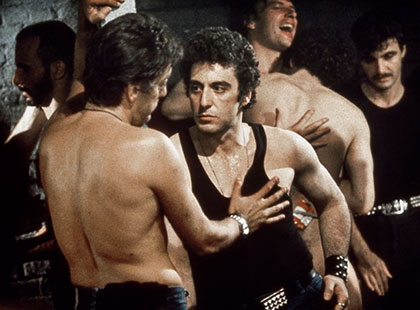
ABOUT THE PROJECT
LOGLINE
Gay men are being murdered in 1970s New York City…a crusading journalist is desperate to warn his readers…a famous Hollywood director is looking to make his next thriller. This is the true story behind the controversial film Cruising, which ignited furious protests by gay activists and yet is now considered a classic by many who once despised it. But few realize that behind the film lay a true crime far darker, more fascinating, and more revealing, than any Hollywood screenplay.
SYNOPSIS
William Friedkin’s 1980 film Cruising is a movie with many lives. The story of an undercover cop who infiltrates New York’s leather bars to catch a serial killer, it deeply divided the gay community when it was filmed on location in Greenwich Village in 1979. Hundreds of protesters tried to shut it down, while many in the gay community supported the film and participated as extras. The controversy raised vexing questions about freedom of speech and artistic expression, LGBTQ rights, the role of sexual minorities, the limits of sexual liberation and a host of white-hot issues that still resonate today.
After Cruising initially flopped at the box office, it painted such a vividly realistic portrait of 1970s gay New York, particularly the legendary and now-vanished leather bars and cruising areas that today have been gentrified beyond recognition, that many now consider it one of the great classics of gay cinema. Even people who once led protests against it now celebrate the film as a precious time capsule.
But few realize that Cruising was based on one of the most fascinating, gruesome and little-known serial killings in American history. From 1973 to 1977 someone was murdering gay men, dismembering their bodies and dumping them in plastic bags in the Hudson River. Cops called it the “Fag in a Bag” murder spree and the mainstream press totally ignored it.
But one crusading gay reporter at The Village Voice, Arthur Bell, raised the alarm in a sensational series of articles. And when a disturbed gay man named Paul Bateson murdered film critic Addison Verrill, Arthur Bell actually helped the cops catch Bateson and bring him to justice. But was Bateson responsible for any of the other murders, still to this day unsolved?
The stories of the crusading gay reporter, the alcoholic killer and his victim—an out gay man enjoying his newly won liberation—provide a unique window into the formative years of the gay movement. How the murders inspired director William Friedkin to make Cruising is one of the great, untold tales of Hollywood history. And the story of the subsequent protests, the film’s initial reception, the mass shooting that followed, and today’s critical reappraisal has more twists and turns than most Hollywood thrillers. Rarely has a true-crime saga had so many repercussions, touched so many lives, or so profoundly changed the course of social history in America.
PROJECT TYPE Documentary Feature
DIRECTOR Jeffrey Schwarz
PRODUCER John Boccardo, Jeffrey Schwarz
WEBSITE automatpictures.com/mineshaft
🎬 Support independent film through The Film Collaborative
The Film Collaborative (TFC) is a 501(c)(3) nonprofit supporting independent filmmakers.
Federal Tax ID: 32-0295081
Your gift is tax-deductible as allowed by law.
💳 Ways to Give
- Online:
Click the Donate button above. You can:- Use your PayPal account, or
- Check out as a guest with your debit/credit card — no PayPal account required.
- ACH or Wire
Email us for instructions.
- Zelle
Email us for instructions.
- Check
Checks are accepted, but for time and security reasons, electronic donations are preferred when possible.
Check donation instructions are here.
- Stock
Donating appreciated stock can increase your impact by up to 20%.
Learn more about advantages of stock donations here.
Email us for instructions.
- Donor-Advised Funds (DAF):
Instructions for donating from a DAF are here.
📈 Maximize Your Gift
- Many employers offer matching gifts, doubling or even tripling your donation. Some match contributions up to a year after they’re made.
- When donating via PayPal, consider covering the small processing fee to make the most of your gift toward the project.
📄 Tax Receipts
- In compliance with IRS rules, tax receipts are issued for the amount TFC receives after payment processor fees are deducted.
- PDF tax receipts are emailed within 30 days of your online donation.
- The “receipt” immediately sent by PayPal is only a payment confirmation — it is not your tax receipt.
Thank you for helping bring powerful independent films to life.
ID: 119